Business Ethics and Responsible Management: NHS Case Study Report
VerifiedAdded on 2021/02/22
|13
|3726
|60
Report
AI Summary
This report delves into the realm of business ethics and responsible management, with a specific focus on the National Health Service (NHS) in the United Kingdom. It examines the ethical considerations surrounding the acceptance of gifts and luxury dinners by doctors from drug suppliers, highlighting the potential for conflicts of interest. The report explores various ethical theories, including deontology and utilitarianism, and their application within the healthcare industry. It analyzes the impact of ethical or unethical practices on business functioning, emphasizing the importance of developing codes of conduct and prioritizing social welfare. The report also provides recommendations for both drug suppliers and doctors, advocating for transparency, ethical decision-making, and a focus on patient well-being, ultimately contributing to the overall responsible management of healthcare practices. The report is divided into three parts, covering the introduction, main body, and conclusion of the topics discussed.
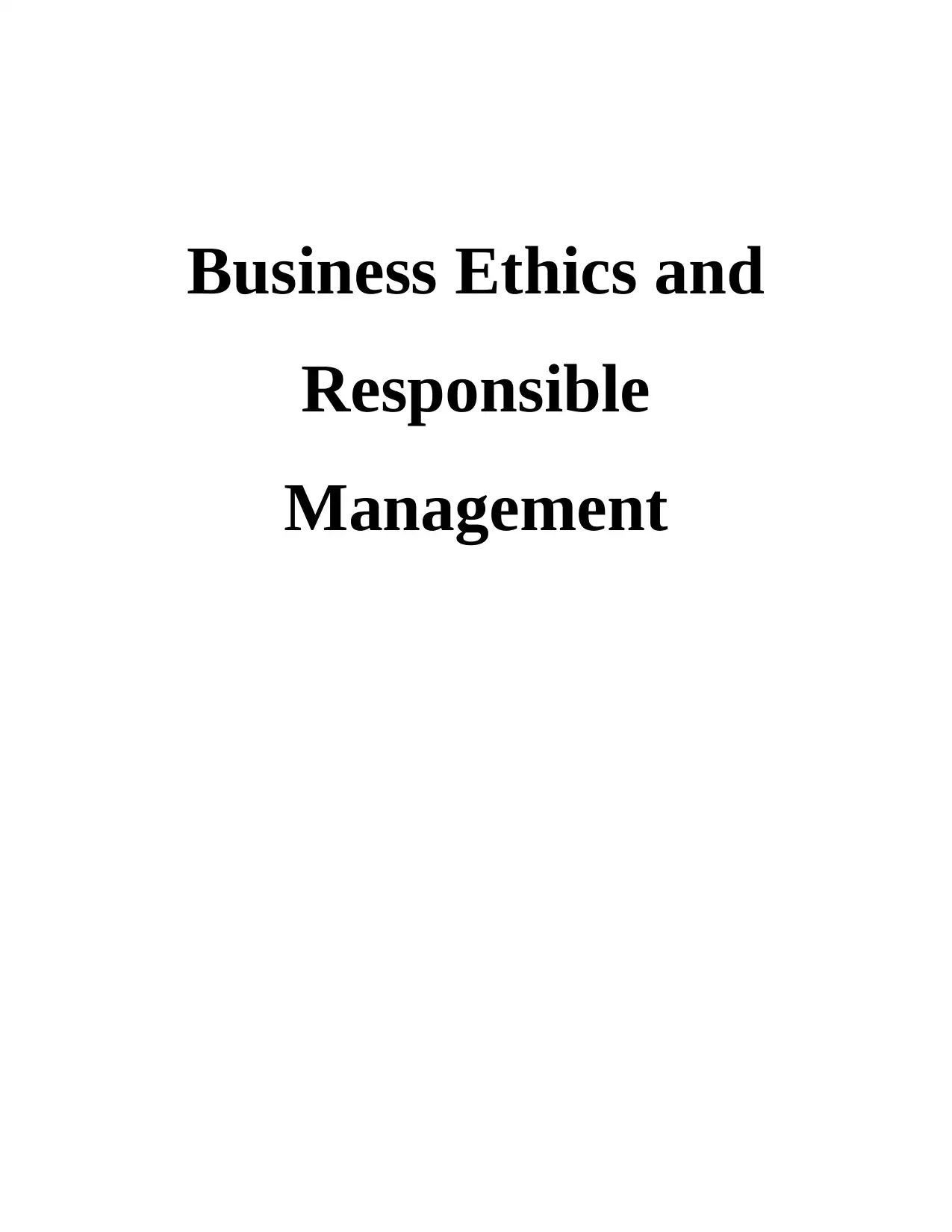
Business Ethics and
Responsible
Management
Responsible
Management
Paraphrase This Document
Need a fresh take? Get an instant paraphrase of this document with our AI Paraphraser
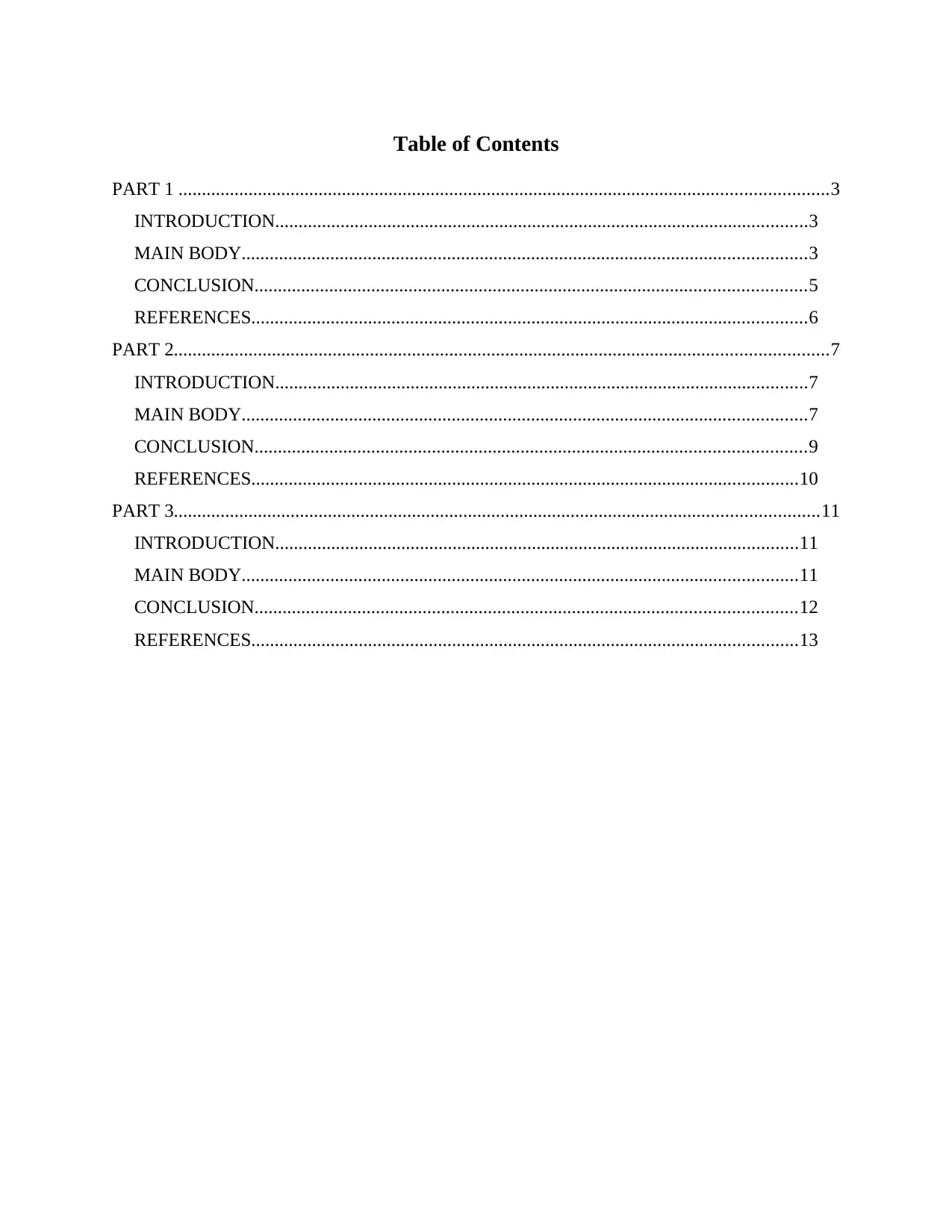
Table of Contents
PART 1 ...........................................................................................................................................3
INTRODUCTION..................................................................................................................3
MAIN BODY.........................................................................................................................3
CONCLUSION......................................................................................................................5
REFERENCES.......................................................................................................................6
PART 2............................................................................................................................................7
INTRODUCTION..................................................................................................................7
MAIN BODY.........................................................................................................................7
CONCLUSION......................................................................................................................9
REFERENCES.....................................................................................................................10
PART 3..........................................................................................................................................11
INTRODUCTION................................................................................................................11
MAIN BODY.......................................................................................................................11
CONCLUSION....................................................................................................................12
REFERENCES.....................................................................................................................13
PART 1 ...........................................................................................................................................3
INTRODUCTION..................................................................................................................3
MAIN BODY.........................................................................................................................3
CONCLUSION......................................................................................................................5
REFERENCES.......................................................................................................................6
PART 2............................................................................................................................................7
INTRODUCTION..................................................................................................................7
MAIN BODY.........................................................................................................................7
CONCLUSION......................................................................................................................9
REFERENCES.....................................................................................................................10
PART 3..........................................................................................................................................11
INTRODUCTION................................................................................................................11
MAIN BODY.......................................................................................................................11
CONCLUSION....................................................................................................................12
REFERENCES.....................................................................................................................13
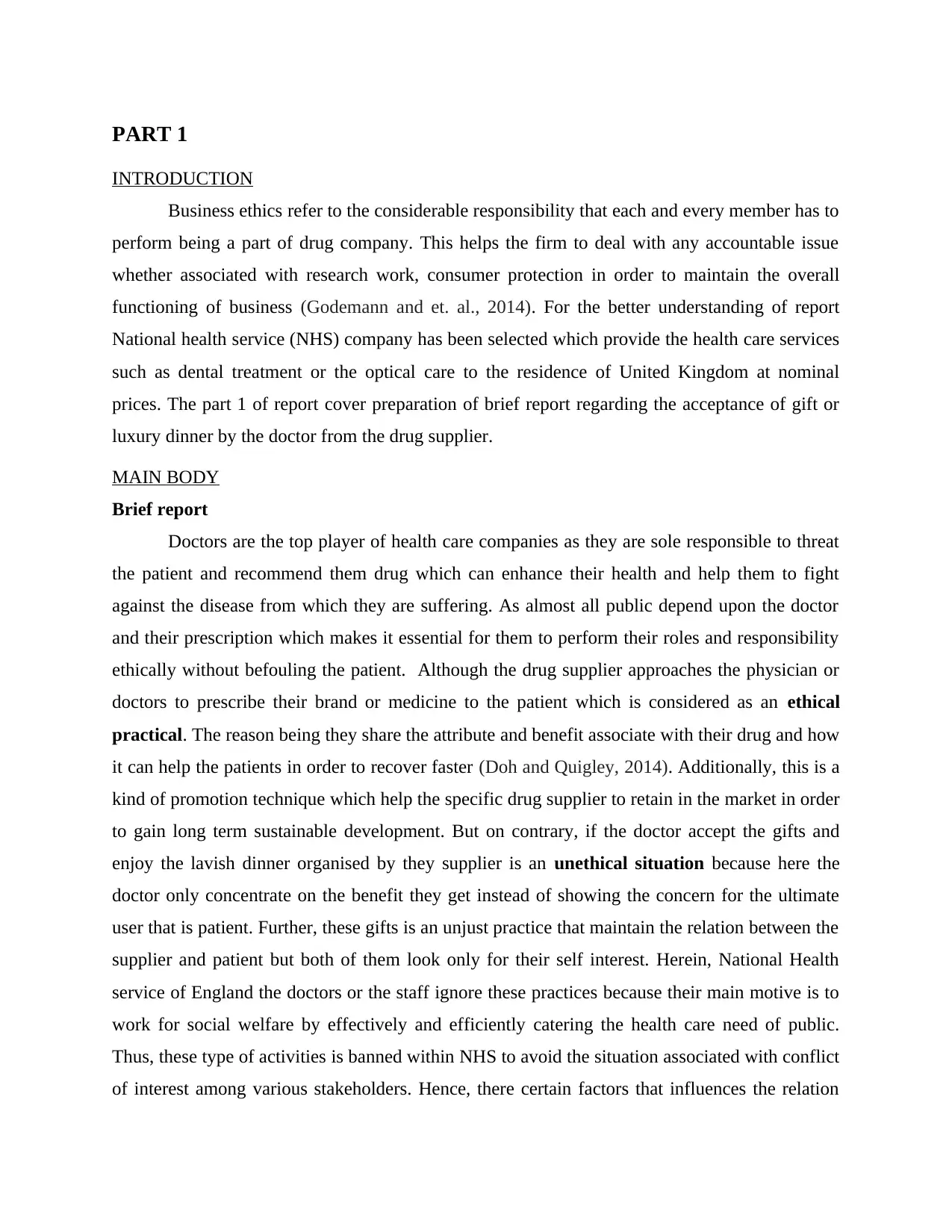
PART 1
INTRODUCTION
Business ethics refer to the considerable responsibility that each and every member has to
perform being a part of drug company. This helps the firm to deal with any accountable issue
whether associated with research work, consumer protection in order to maintain the overall
functioning of business (Godemann and et. al., 2014). For the better understanding of report
National health service (NHS) company has been selected which provide the health care services
such as dental treatment or the optical care to the residence of United Kingdom at nominal
prices. The part 1 of report cover preparation of brief report regarding the acceptance of gift or
luxury dinner by the doctor from the drug supplier.
MAIN BODY
Brief report
Doctors are the top player of health care companies as they are sole responsible to threat
the patient and recommend them drug which can enhance their health and help them to fight
against the disease from which they are suffering. As almost all public depend upon the doctor
and their prescription which makes it essential for them to perform their roles and responsibility
ethically without befouling the patient. Although the drug supplier approaches the physician or
doctors to prescribe their brand or medicine to the patient which is considered as an ethical
practical. The reason being they share the attribute and benefit associate with their drug and how
it can help the patients in order to recover faster (Doh and Quigley, 2014). Additionally, this is a
kind of promotion technique which help the specific drug supplier to retain in the market in order
to gain long term sustainable development. But on contrary, if the doctor accept the gifts and
enjoy the lavish dinner organised by they supplier is an unethical situation because here the
doctor only concentrate on the benefit they get instead of showing the concern for the ultimate
user that is patient. Further, these gifts is an unjust practice that maintain the relation between the
supplier and patient but both of them look only for their self interest. Herein, National Health
service of England the doctors or the staff ignore these practices because their main motive is to
work for social welfare by effectively and efficiently catering the health care need of public.
Thus, these type of activities is banned within NHS to avoid the situation associated with conflict
of interest among various stakeholders. Hence, there certain factors that influences the relation
INTRODUCTION
Business ethics refer to the considerable responsibility that each and every member has to
perform being a part of drug company. This helps the firm to deal with any accountable issue
whether associated with research work, consumer protection in order to maintain the overall
functioning of business (Godemann and et. al., 2014). For the better understanding of report
National health service (NHS) company has been selected which provide the health care services
such as dental treatment or the optical care to the residence of United Kingdom at nominal
prices. The part 1 of report cover preparation of brief report regarding the acceptance of gift or
luxury dinner by the doctor from the drug supplier.
MAIN BODY
Brief report
Doctors are the top player of health care companies as they are sole responsible to threat
the patient and recommend them drug which can enhance their health and help them to fight
against the disease from which they are suffering. As almost all public depend upon the doctor
and their prescription which makes it essential for them to perform their roles and responsibility
ethically without befouling the patient. Although the drug supplier approaches the physician or
doctors to prescribe their brand or medicine to the patient which is considered as an ethical
practical. The reason being they share the attribute and benefit associate with their drug and how
it can help the patients in order to recover faster (Doh and Quigley, 2014). Additionally, this is a
kind of promotion technique which help the specific drug supplier to retain in the market in order
to gain long term sustainable development. But on contrary, if the doctor accept the gifts and
enjoy the lavish dinner organised by they supplier is an unethical situation because here the
doctor only concentrate on the benefit they get instead of showing the concern for the ultimate
user that is patient. Further, these gifts is an unjust practice that maintain the relation between the
supplier and patient but both of them look only for their self interest. Herein, National Health
service of England the doctors or the staff ignore these practices because their main motive is to
work for social welfare by effectively and efficiently catering the health care need of public.
Thus, these type of activities is banned within NHS to avoid the situation associated with conflict
of interest among various stakeholders. Hence, there certain factors that influences the relation
⊘ This is a preview!⊘
Do you want full access?
Subscribe today to unlock all pages.

Trusted by 1+ million students worldwide
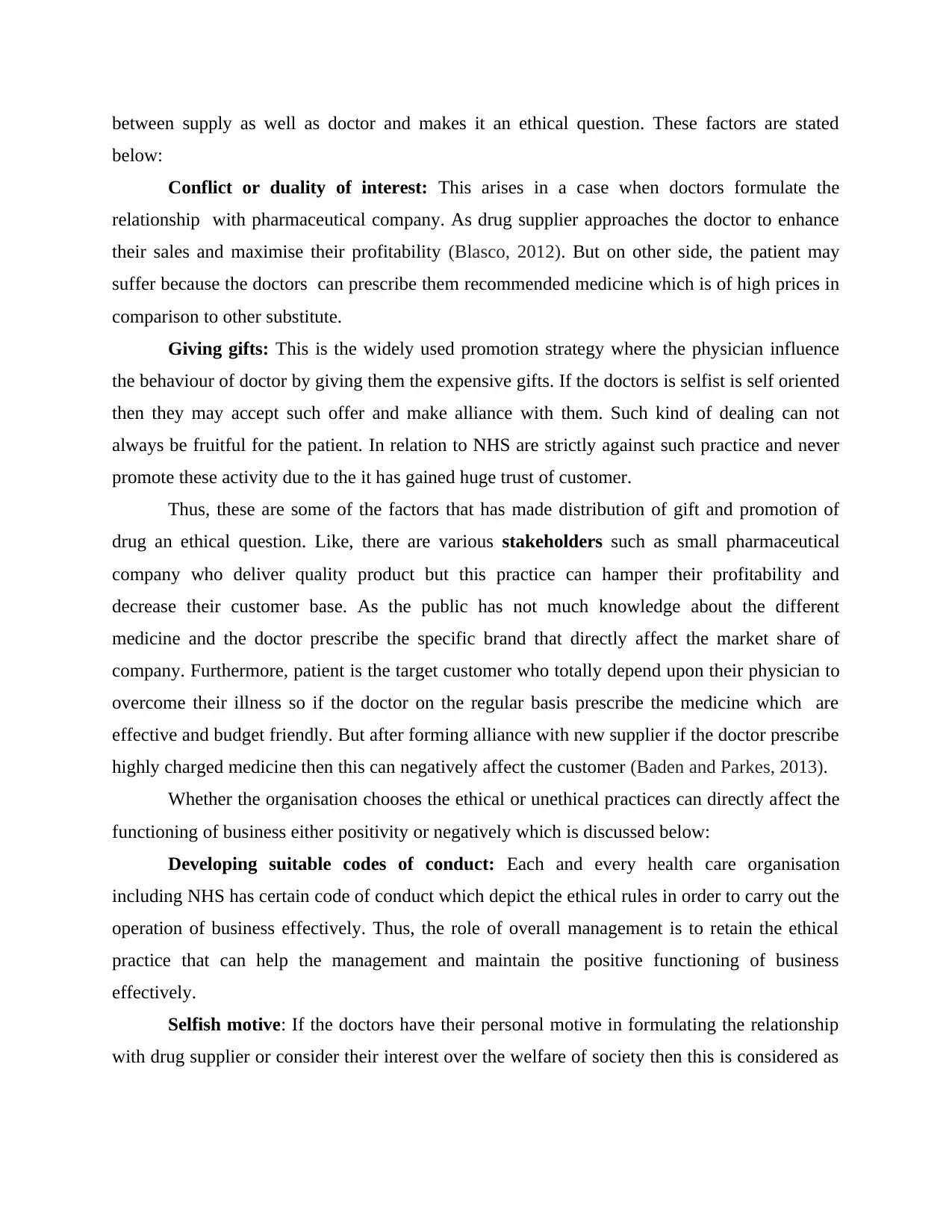
between supply as well as doctor and makes it an ethical question. These factors are stated
below:
Conflict or duality of interest: This arises in a case when doctors formulate the
relationship with pharmaceutical company. As drug supplier approaches the doctor to enhance
their sales and maximise their profitability (Blasco, 2012). But on other side, the patient may
suffer because the doctors can prescribe them recommended medicine which is of high prices in
comparison to other substitute.
Giving gifts: This is the widely used promotion strategy where the physician influence
the behaviour of doctor by giving them the expensive gifts. If the doctors is selfist is self oriented
then they may accept such offer and make alliance with them. Such kind of dealing can not
always be fruitful for the patient. In relation to NHS are strictly against such practice and never
promote these activity due to the it has gained huge trust of customer.
Thus, these are some of the factors that has made distribution of gift and promotion of
drug an ethical question. Like, there are various stakeholders such as small pharmaceutical
company who deliver quality product but this practice can hamper their profitability and
decrease their customer base. As the public has not much knowledge about the different
medicine and the doctor prescribe the specific brand that directly affect the market share of
company. Furthermore, patient is the target customer who totally depend upon their physician to
overcome their illness so if the doctor on the regular basis prescribe the medicine which are
effective and budget friendly. But after forming alliance with new supplier if the doctor prescribe
highly charged medicine then this can negatively affect the customer (Baden and Parkes, 2013).
Whether the organisation chooses the ethical or unethical practices can directly affect the
functioning of business either positivity or negatively which is discussed below:
Developing suitable codes of conduct: Each and every health care organisation
including NHS has certain code of conduct which depict the ethical rules in order to carry out the
operation of business effectively. Thus, the role of overall management is to retain the ethical
practice that can help the management and maintain the positive functioning of business
effectively.
Selfish motive: If the doctors have their personal motive in formulating the relationship
with drug supplier or consider their interest over the welfare of society then this is considered as
below:
Conflict or duality of interest: This arises in a case when doctors formulate the
relationship with pharmaceutical company. As drug supplier approaches the doctor to enhance
their sales and maximise their profitability (Blasco, 2012). But on other side, the patient may
suffer because the doctors can prescribe them recommended medicine which is of high prices in
comparison to other substitute.
Giving gifts: This is the widely used promotion strategy where the physician influence
the behaviour of doctor by giving them the expensive gifts. If the doctors is selfist is self oriented
then they may accept such offer and make alliance with them. Such kind of dealing can not
always be fruitful for the patient. In relation to NHS are strictly against such practice and never
promote these activity due to the it has gained huge trust of customer.
Thus, these are some of the factors that has made distribution of gift and promotion of
drug an ethical question. Like, there are various stakeholders such as small pharmaceutical
company who deliver quality product but this practice can hamper their profitability and
decrease their customer base. As the public has not much knowledge about the different
medicine and the doctor prescribe the specific brand that directly affect the market share of
company. Furthermore, patient is the target customer who totally depend upon their physician to
overcome their illness so if the doctor on the regular basis prescribe the medicine which are
effective and budget friendly. But after forming alliance with new supplier if the doctor prescribe
highly charged medicine then this can negatively affect the customer (Baden and Parkes, 2013).
Whether the organisation chooses the ethical or unethical practices can directly affect the
functioning of business either positivity or negatively which is discussed below:
Developing suitable codes of conduct: Each and every health care organisation
including NHS has certain code of conduct which depict the ethical rules in order to carry out the
operation of business effectively. Thus, the role of overall management is to retain the ethical
practice that can help the management and maintain the positive functioning of business
effectively.
Selfish motive: If the doctors have their personal motive in formulating the relationship
with drug supplier or consider their interest over the welfare of society then this is considered as
Paraphrase This Document
Need a fresh take? Get an instant paraphrase of this document with our AI Paraphraser
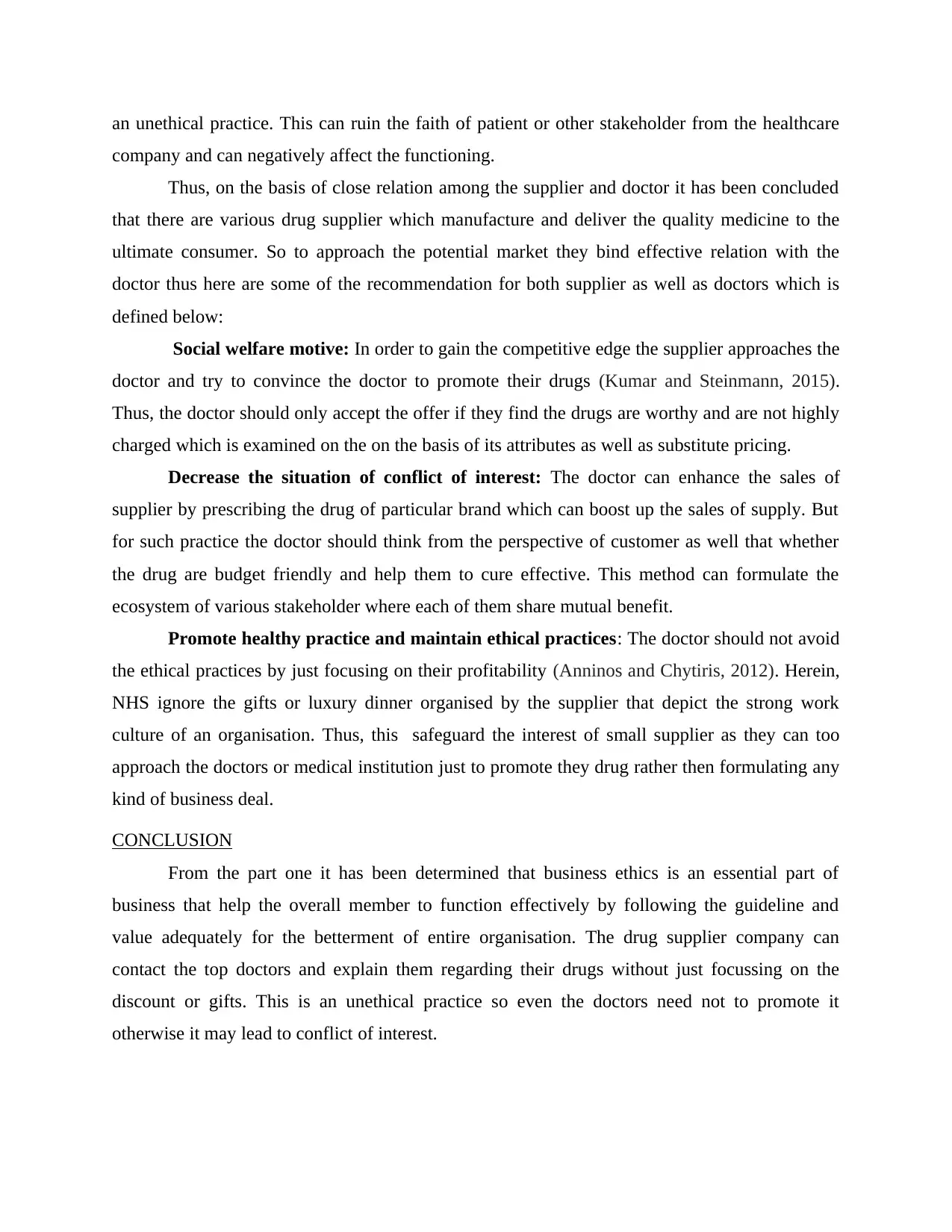
an unethical practice. This can ruin the faith of patient or other stakeholder from the healthcare
company and can negatively affect the functioning.
Thus, on the basis of close relation among the supplier and doctor it has been concluded
that there are various drug supplier which manufacture and deliver the quality medicine to the
ultimate consumer. So to approach the potential market they bind effective relation with the
doctor thus here are some of the recommendation for both supplier as well as doctors which is
defined below:
Social welfare motive: In order to gain the competitive edge the supplier approaches the
doctor and try to convince the doctor to promote their drugs (Kumar and Steinmann, 2015).
Thus, the doctor should only accept the offer if they find the drugs are worthy and are not highly
charged which is examined on the on the basis of its attributes as well as substitute pricing.
Decrease the situation of conflict of interest: The doctor can enhance the sales of
supplier by prescribing the drug of particular brand which can boost up the sales of supply. But
for such practice the doctor should think from the perspective of customer as well that whether
the drug are budget friendly and help them to cure effective. This method can formulate the
ecosystem of various stakeholder where each of them share mutual benefit.
Promote healthy practice and maintain ethical practices: The doctor should not avoid
the ethical practices by just focusing on their profitability (Anninos and Chytiris, 2012). Herein,
NHS ignore the gifts or luxury dinner organised by the supplier that depict the strong work
culture of an organisation. Thus, this safeguard the interest of small supplier as they can too
approach the doctors or medical institution just to promote they drug rather then formulating any
kind of business deal.
CONCLUSION
From the part one it has been determined that business ethics is an essential part of
business that help the overall member to function effectively by following the guideline and
value adequately for the betterment of entire organisation. The drug supplier company can
contact the top doctors and explain them regarding their drugs without just focussing on the
discount or gifts. This is an unethical practice so even the doctors need not to promote it
otherwise it may lead to conflict of interest.
company and can negatively affect the functioning.
Thus, on the basis of close relation among the supplier and doctor it has been concluded
that there are various drug supplier which manufacture and deliver the quality medicine to the
ultimate consumer. So to approach the potential market they bind effective relation with the
doctor thus here are some of the recommendation for both supplier as well as doctors which is
defined below:
Social welfare motive: In order to gain the competitive edge the supplier approaches the
doctor and try to convince the doctor to promote their drugs (Kumar and Steinmann, 2015).
Thus, the doctor should only accept the offer if they find the drugs are worthy and are not highly
charged which is examined on the on the basis of its attributes as well as substitute pricing.
Decrease the situation of conflict of interest: The doctor can enhance the sales of
supplier by prescribing the drug of particular brand which can boost up the sales of supply. But
for such practice the doctor should think from the perspective of customer as well that whether
the drug are budget friendly and help them to cure effective. This method can formulate the
ecosystem of various stakeholder where each of them share mutual benefit.
Promote healthy practice and maintain ethical practices: The doctor should not avoid
the ethical practices by just focusing on their profitability (Anninos and Chytiris, 2012). Herein,
NHS ignore the gifts or luxury dinner organised by the supplier that depict the strong work
culture of an organisation. Thus, this safeguard the interest of small supplier as they can too
approach the doctors or medical institution just to promote they drug rather then formulating any
kind of business deal.
CONCLUSION
From the part one it has been determined that business ethics is an essential part of
business that help the overall member to function effectively by following the guideline and
value adequately for the betterment of entire organisation. The drug supplier company can
contact the top doctors and explain them regarding their drugs without just focussing on the
discount or gifts. This is an unethical practice so even the doctors need not to promote it
otherwise it may lead to conflict of interest.
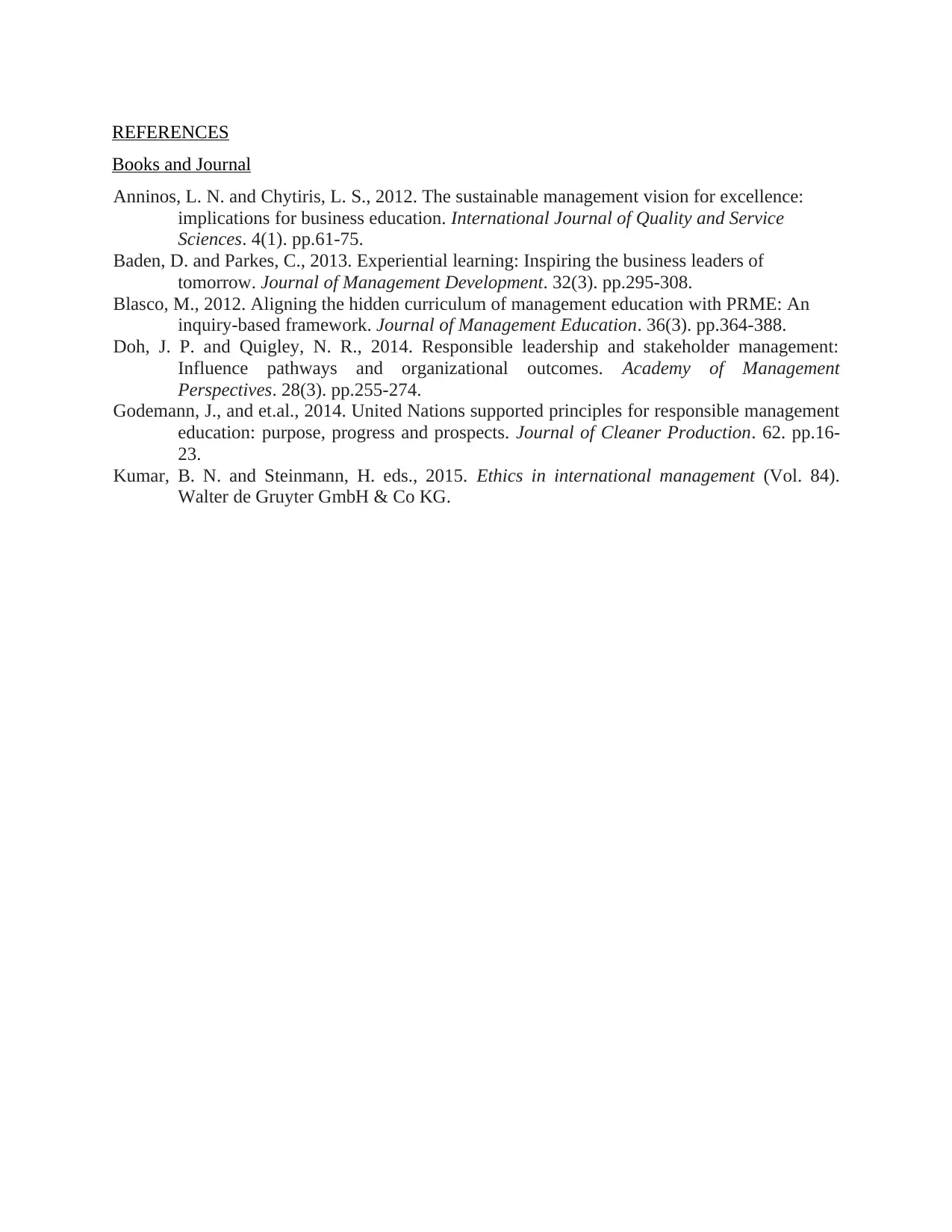
REFERENCES
Books and Journal
Anninos, L. N. and Chytiris, L. S., 2012. The sustainable management vision for excellence:
implications for business education. International Journal of Quality and Service
Sciences. 4(1). pp.61-75.
Baden, D. and Parkes, C., 2013. Experiential learning: Inspiring the business leaders of
tomorrow. Journal of Management Development. 32(3). pp.295-308.
Blasco, M., 2012. Aligning the hidden curriculum of management education with PRME: An
inquiry-based framework. Journal of Management Education. 36(3). pp.364-388.
Doh, J. P. and Quigley, N. R., 2014. Responsible leadership and stakeholder management:
Influence pathways and organizational outcomes. Academy of Management
Perspectives. 28(3). pp.255-274.
Godemann, J., and et.al., 2014. United Nations supported principles for responsible management
education: purpose, progress and prospects. Journal of Cleaner Production. 62. pp.16-
23.
Kumar, B. N. and Steinmann, H. eds., 2015. Ethics in international management (Vol. 84).
Walter de Gruyter GmbH & Co KG.
Books and Journal
Anninos, L. N. and Chytiris, L. S., 2012. The sustainable management vision for excellence:
implications for business education. International Journal of Quality and Service
Sciences. 4(1). pp.61-75.
Baden, D. and Parkes, C., 2013. Experiential learning: Inspiring the business leaders of
tomorrow. Journal of Management Development. 32(3). pp.295-308.
Blasco, M., 2012. Aligning the hidden curriculum of management education with PRME: An
inquiry-based framework. Journal of Management Education. 36(3). pp.364-388.
Doh, J. P. and Quigley, N. R., 2014. Responsible leadership and stakeholder management:
Influence pathways and organizational outcomes. Academy of Management
Perspectives. 28(3). pp.255-274.
Godemann, J., and et.al., 2014. United Nations supported principles for responsible management
education: purpose, progress and prospects. Journal of Cleaner Production. 62. pp.16-
23.
Kumar, B. N. and Steinmann, H. eds., 2015. Ethics in international management (Vol. 84).
Walter de Gruyter GmbH & Co KG.
⊘ This is a preview!⊘
Do you want full access?
Subscribe today to unlock all pages.

Trusted by 1+ million students worldwide
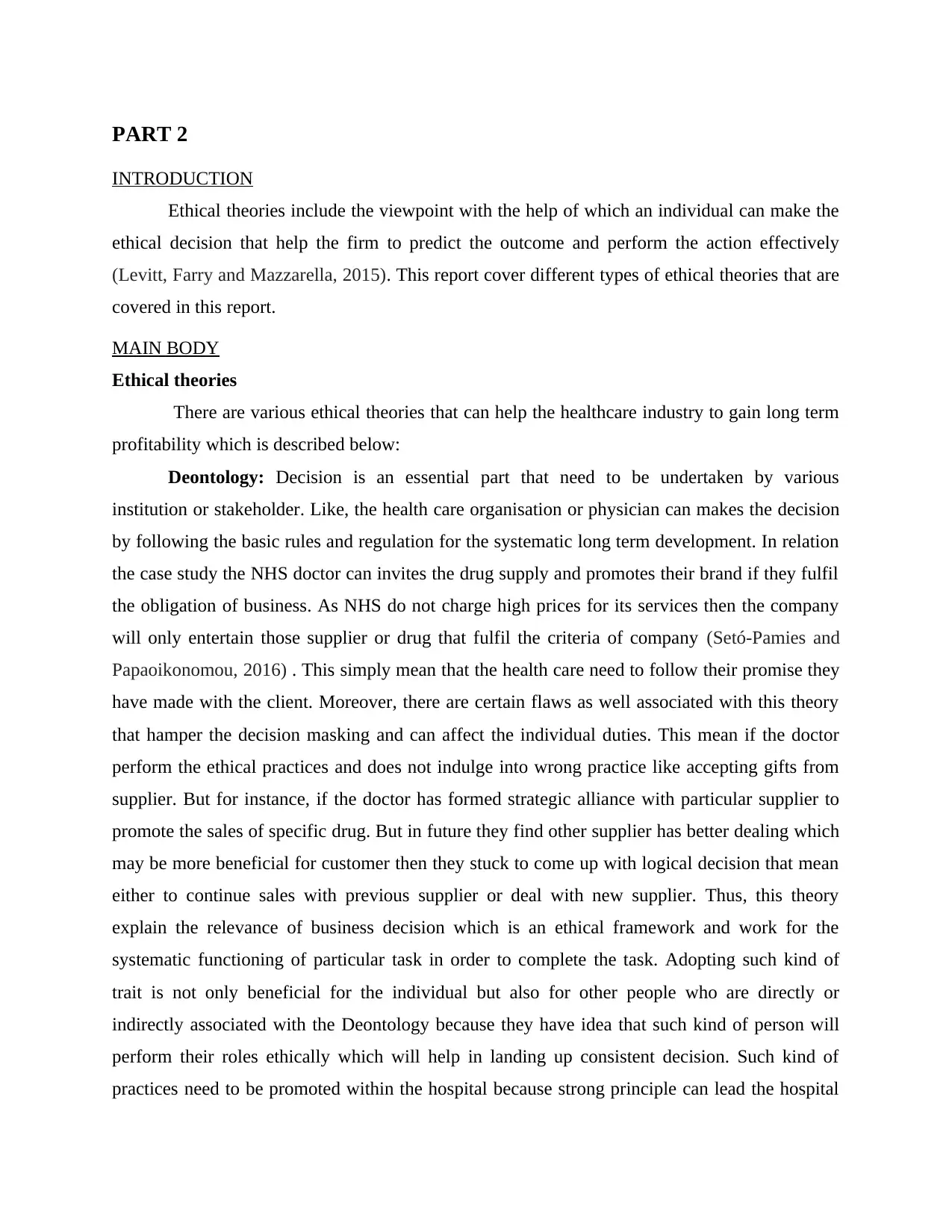
PART 2
INTRODUCTION
Ethical theories include the viewpoint with the help of which an individual can make the
ethical decision that help the firm to predict the outcome and perform the action effectively
(Levitt, Farry and Mazzarella, 2015). This report cover different types of ethical theories that are
covered in this report.
MAIN BODY
Ethical theories
There are various ethical theories that can help the healthcare industry to gain long term
profitability which is described below:
Deontology: Decision is an essential part that need to be undertaken by various
institution or stakeholder. Like, the health care organisation or physician can makes the decision
by following the basic rules and regulation for the systematic long term development. In relation
the case study the NHS doctor can invites the drug supply and promotes their brand if they fulfil
the obligation of business. As NHS do not charge high prices for its services then the company
will only entertain those supplier or drug that fulfil the criteria of company (Setó-Pamies and
Papaoikonomou, 2016) . This simply mean that the health care need to follow their promise they
have made with the client. Moreover, there are certain flaws as well associated with this theory
that hamper the decision masking and can affect the individual duties. This mean if the doctor
perform the ethical practices and does not indulge into wrong practice like accepting gifts from
supplier. But for instance, if the doctor has formed strategic alliance with particular supplier to
promote the sales of specific drug. But in future they find other supplier has better dealing which
may be more beneficial for customer then they stuck to come up with logical decision that mean
either to continue sales with previous supplier or deal with new supplier. Thus, this theory
explain the relevance of business decision which is an ethical framework and work for the
systematic functioning of particular task in order to complete the task. Adopting such kind of
trait is not only beneficial for the individual but also for other people who are directly or
indirectly associated with the Deontology because they have idea that such kind of person will
perform their roles ethically which will help in landing up consistent decision. Such kind of
practices need to be promoted within the hospital because strong principle can lead the hospital
INTRODUCTION
Ethical theories include the viewpoint with the help of which an individual can make the
ethical decision that help the firm to predict the outcome and perform the action effectively
(Levitt, Farry and Mazzarella, 2015). This report cover different types of ethical theories that are
covered in this report.
MAIN BODY
Ethical theories
There are various ethical theories that can help the healthcare industry to gain long term
profitability which is described below:
Deontology: Decision is an essential part that need to be undertaken by various
institution or stakeholder. Like, the health care organisation or physician can makes the decision
by following the basic rules and regulation for the systematic long term development. In relation
the case study the NHS doctor can invites the drug supply and promotes their brand if they fulfil
the obligation of business. As NHS do not charge high prices for its services then the company
will only entertain those supplier or drug that fulfil the criteria of company (Setó-Pamies and
Papaoikonomou, 2016) . This simply mean that the health care need to follow their promise they
have made with the client. Moreover, there are certain flaws as well associated with this theory
that hamper the decision masking and can affect the individual duties. This mean if the doctor
perform the ethical practices and does not indulge into wrong practice like accepting gifts from
supplier. But for instance, if the doctor has formed strategic alliance with particular supplier to
promote the sales of specific drug. But in future they find other supplier has better dealing which
may be more beneficial for customer then they stuck to come up with logical decision that mean
either to continue sales with previous supplier or deal with new supplier. Thus, this theory
explain the relevance of business decision which is an ethical framework and work for the
systematic functioning of particular task in order to complete the task. Adopting such kind of
trait is not only beneficial for the individual but also for other people who are directly or
indirectly associated with the Deontology because they have idea that such kind of person will
perform their roles ethically which will help in landing up consistent decision. Such kind of
practices need to be promoted within the hospital because strong principle can lead the hospital
Paraphrase This Document
Need a fresh take? Get an instant paraphrase of this document with our AI Paraphraser
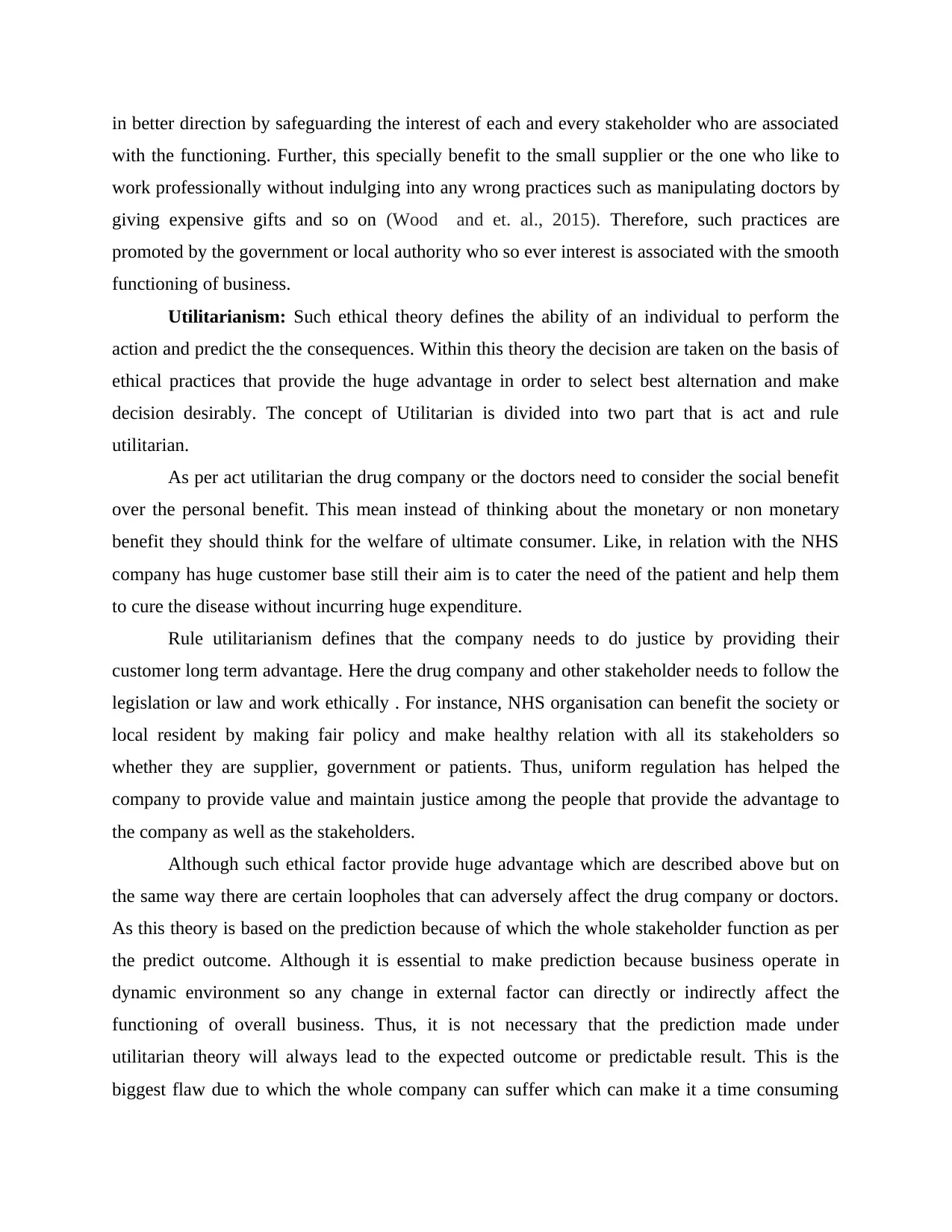
in better direction by safeguarding the interest of each and every stakeholder who are associated
with the functioning. Further, this specially benefit to the small supplier or the one who like to
work professionally without indulging into any wrong practices such as manipulating doctors by
giving expensive gifts and so on (Wood and et. al., 2015). Therefore, such practices are
promoted by the government or local authority who so ever interest is associated with the smooth
functioning of business.
Utilitarianism: Such ethical theory defines the ability of an individual to perform the
action and predict the the consequences. Within this theory the decision are taken on the basis of
ethical practices that provide the huge advantage in order to select best alternation and make
decision desirably. The concept of Utilitarian is divided into two part that is act and rule
utilitarian.
As per act utilitarian the drug company or the doctors need to consider the social benefit
over the personal benefit. This mean instead of thinking about the monetary or non monetary
benefit they should think for the welfare of ultimate consumer. Like, in relation with the NHS
company has huge customer base still their aim is to cater the need of the patient and help them
to cure the disease without incurring huge expenditure.
Rule utilitarianism defines that the company needs to do justice by providing their
customer long term advantage. Here the drug company and other stakeholder needs to follow the
legislation or law and work ethically . For instance, NHS organisation can benefit the society or
local resident by making fair policy and make healthy relation with all its stakeholders so
whether they are supplier, government or patients. Thus, uniform regulation has helped the
company to provide value and maintain justice among the people that provide the advantage to
the company as well as the stakeholders.
Although such ethical factor provide huge advantage which are described above but on
the same way there are certain loopholes that can adversely affect the drug company or doctors.
As this theory is based on the prediction because of which the whole stakeholder function as per
the predict outcome. Although it is essential to make prediction because business operate in
dynamic environment so any change in external factor can directly or indirectly affect the
functioning of overall business. Thus, it is not necessary that the prediction made under
utilitarian theory will always lead to the expected outcome or predictable result. This is the
biggest flaw due to which the whole company can suffer which can make it a time consuming
with the functioning. Further, this specially benefit to the small supplier or the one who like to
work professionally without indulging into any wrong practices such as manipulating doctors by
giving expensive gifts and so on (Wood and et. al., 2015). Therefore, such practices are
promoted by the government or local authority who so ever interest is associated with the smooth
functioning of business.
Utilitarianism: Such ethical theory defines the ability of an individual to perform the
action and predict the the consequences. Within this theory the decision are taken on the basis of
ethical practices that provide the huge advantage in order to select best alternation and make
decision desirably. The concept of Utilitarian is divided into two part that is act and rule
utilitarian.
As per act utilitarian the drug company or the doctors need to consider the social benefit
over the personal benefit. This mean instead of thinking about the monetary or non monetary
benefit they should think for the welfare of ultimate consumer. Like, in relation with the NHS
company has huge customer base still their aim is to cater the need of the patient and help them
to cure the disease without incurring huge expenditure.
Rule utilitarianism defines that the company needs to do justice by providing their
customer long term advantage. Here the drug company and other stakeholder needs to follow the
legislation or law and work ethically . For instance, NHS organisation can benefit the society or
local resident by making fair policy and make healthy relation with all its stakeholders so
whether they are supplier, government or patients. Thus, uniform regulation has helped the
company to provide value and maintain justice among the people that provide the advantage to
the company as well as the stakeholders.
Although such ethical factor provide huge advantage which are described above but on
the same way there are certain loopholes that can adversely affect the drug company or doctors.
As this theory is based on the prediction because of which the whole stakeholder function as per
the predict outcome. Although it is essential to make prediction because business operate in
dynamic environment so any change in external factor can directly or indirectly affect the
functioning of overall business. Thus, it is not necessary that the prediction made under
utilitarian theory will always lead to the expected outcome or predictable result. This is the
biggest flaw due to which the whole company can suffer which can make it a time consuming
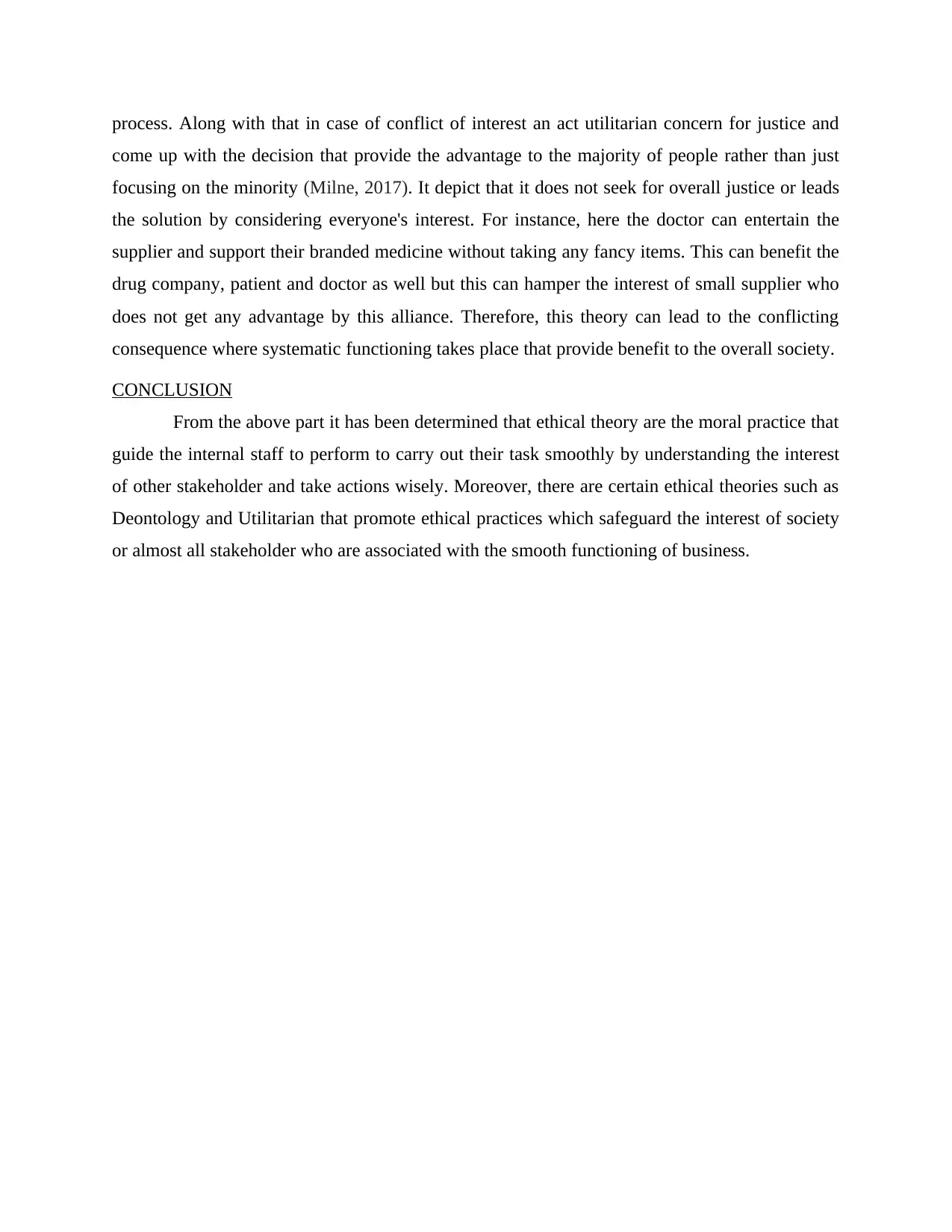
process. Along with that in case of conflict of interest an act utilitarian concern for justice and
come up with the decision that provide the advantage to the majority of people rather than just
focusing on the minority (Milne, 2017). It depict that it does not seek for overall justice or leads
the solution by considering everyone's interest. For instance, here the doctor can entertain the
supplier and support their branded medicine without taking any fancy items. This can benefit the
drug company, patient and doctor as well but this can hamper the interest of small supplier who
does not get any advantage by this alliance. Therefore, this theory can lead to the conflicting
consequence where systematic functioning takes place that provide benefit to the overall society.
CONCLUSION
From the above part it has been determined that ethical theory are the moral practice that
guide the internal staff to perform to carry out their task smoothly by understanding the interest
of other stakeholder and take actions wisely. Moreover, there are certain ethical theories such as
Deontology and Utilitarian that promote ethical practices which safeguard the interest of society
or almost all stakeholder who are associated with the smooth functioning of business.
come up with the decision that provide the advantage to the majority of people rather than just
focusing on the minority (Milne, 2017). It depict that it does not seek for overall justice or leads
the solution by considering everyone's interest. For instance, here the doctor can entertain the
supplier and support their branded medicine without taking any fancy items. This can benefit the
drug company, patient and doctor as well but this can hamper the interest of small supplier who
does not get any advantage by this alliance. Therefore, this theory can lead to the conflicting
consequence where systematic functioning takes place that provide benefit to the overall society.
CONCLUSION
From the above part it has been determined that ethical theory are the moral practice that
guide the internal staff to perform to carry out their task smoothly by understanding the interest
of other stakeholder and take actions wisely. Moreover, there are certain ethical theories such as
Deontology and Utilitarian that promote ethical practices which safeguard the interest of society
or almost all stakeholder who are associated with the smooth functioning of business.
⊘ This is a preview!⊘
Do you want full access?
Subscribe today to unlock all pages.

Trusted by 1+ million students worldwide
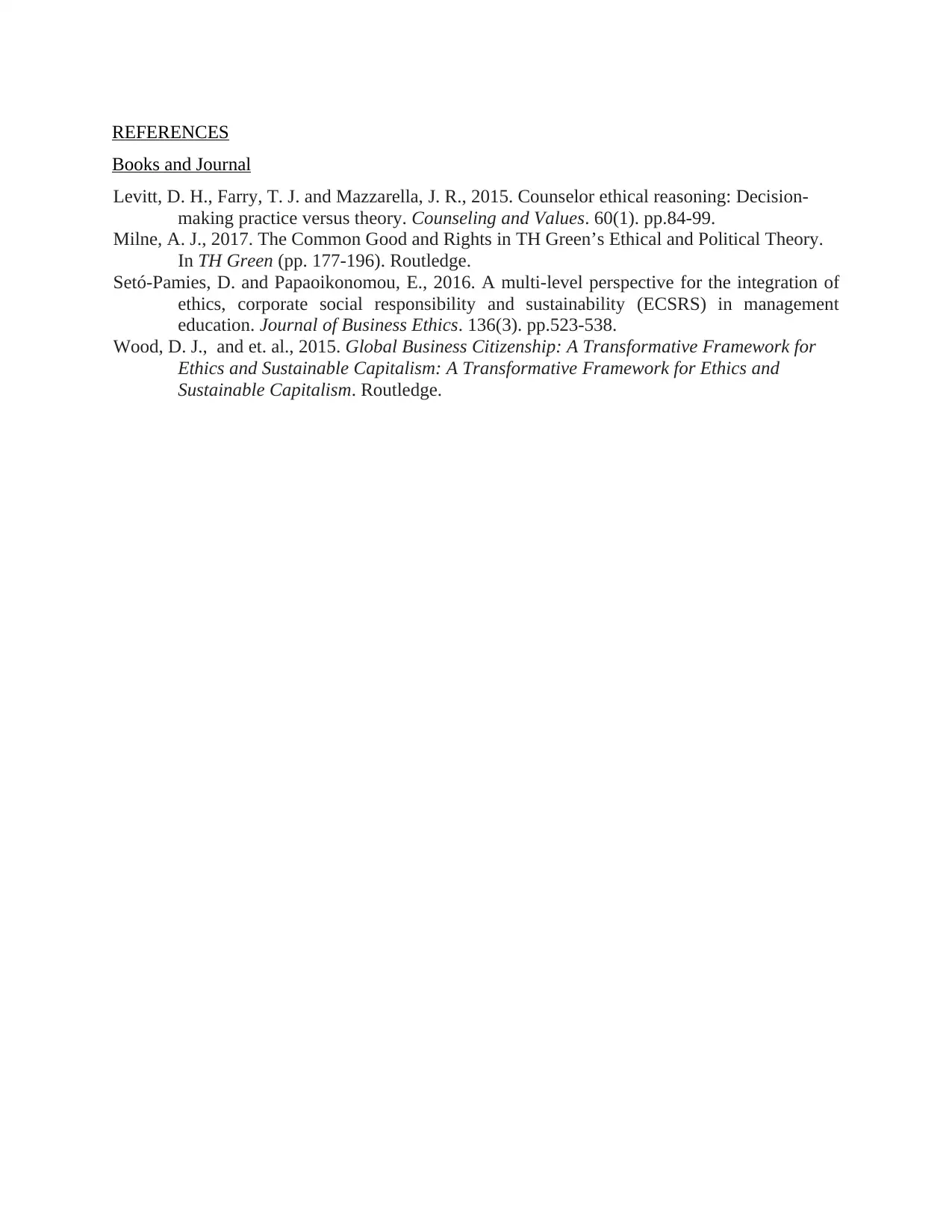
REFERENCES
Books and Journal
Levitt, D. H., Farry, T. J. and Mazzarella, J. R., 2015. Counselor ethical reasoning: Decision‐
making practice versus theory. Counseling and Values. 60(1). pp.84-99.
Milne, A. J., 2017. The Common Good and Rights in TH Green’s Ethical and Political Theory.
In TH Green (pp. 177-196). Routledge.
Setó-Pamies, D. and Papaoikonomou, E., 2016. A multi-level perspective for the integration of
ethics, corporate social responsibility and sustainability (ECSRS) in management
education. Journal of Business Ethics. 136(3). pp.523-538.
Wood, D. J., and et. al., 2015. Global Business Citizenship: A Transformative Framework for
Ethics and Sustainable Capitalism: A Transformative Framework for Ethics and
Sustainable Capitalism. Routledge.
Books and Journal
Levitt, D. H., Farry, T. J. and Mazzarella, J. R., 2015. Counselor ethical reasoning: Decision‐
making practice versus theory. Counseling and Values. 60(1). pp.84-99.
Milne, A. J., 2017. The Common Good and Rights in TH Green’s Ethical and Political Theory.
In TH Green (pp. 177-196). Routledge.
Setó-Pamies, D. and Papaoikonomou, E., 2016. A multi-level perspective for the integration of
ethics, corporate social responsibility and sustainability (ECSRS) in management
education. Journal of Business Ethics. 136(3). pp.523-538.
Wood, D. J., and et. al., 2015. Global Business Citizenship: A Transformative Framework for
Ethics and Sustainable Capitalism: A Transformative Framework for Ethics and
Sustainable Capitalism. Routledge.
Paraphrase This Document
Need a fresh take? Get an instant paraphrase of this document with our AI Paraphraser
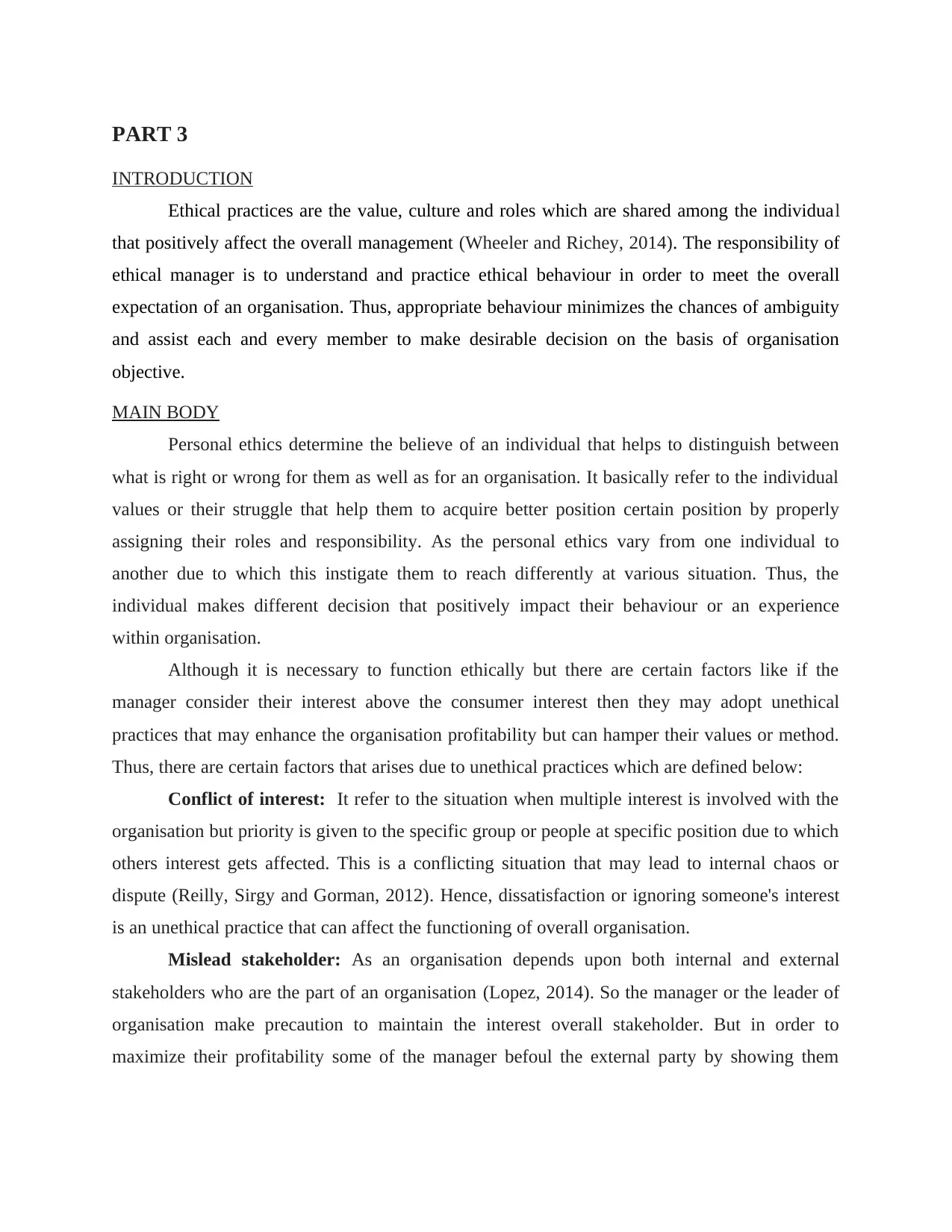
PART 3
INTRODUCTION
Ethical practices are the value, culture and roles which are shared among the individual
that positively affect the overall management (Wheeler and Richey, 2014). The responsibility of
ethical manager is to understand and practice ethical behaviour in order to meet the overall
expectation of an organisation. Thus, appropriate behaviour minimizes the chances of ambiguity
and assist each and every member to make desirable decision on the basis of organisation
objective.
MAIN BODY
Personal ethics determine the believe of an individual that helps to distinguish between
what is right or wrong for them as well as for an organisation. It basically refer to the individual
values or their struggle that help them to acquire better position certain position by properly
assigning their roles and responsibility. As the personal ethics vary from one individual to
another due to which this instigate them to reach differently at various situation. Thus, the
individual makes different decision that positively impact their behaviour or an experience
within organisation.
Although it is necessary to function ethically but there are certain factors like if the
manager consider their interest above the consumer interest then they may adopt unethical
practices that may enhance the organisation profitability but can hamper their values or method.
Thus, there are certain factors that arises due to unethical practices which are defined below:
Conflict of interest: It refer to the situation when multiple interest is involved with the
organisation but priority is given to the specific group or people at specific position due to which
others interest gets affected. This is a conflicting situation that may lead to internal chaos or
dispute (Reilly, Sirgy and Gorman, 2012). Hence, dissatisfaction or ignoring someone's interest
is an unethical practice that can affect the functioning of overall organisation.
Mislead stakeholder: As an organisation depends upon both internal and external
stakeholders who are the part of an organisation (Lopez, 2014). So the manager or the leader of
organisation make precaution to maintain the interest overall stakeholder. But in order to
maximize their profitability some of the manager befoul the external party by showing them
INTRODUCTION
Ethical practices are the value, culture and roles which are shared among the individual
that positively affect the overall management (Wheeler and Richey, 2014). The responsibility of
ethical manager is to understand and practice ethical behaviour in order to meet the overall
expectation of an organisation. Thus, appropriate behaviour minimizes the chances of ambiguity
and assist each and every member to make desirable decision on the basis of organisation
objective.
MAIN BODY
Personal ethics determine the believe of an individual that helps to distinguish between
what is right or wrong for them as well as for an organisation. It basically refer to the individual
values or their struggle that help them to acquire better position certain position by properly
assigning their roles and responsibility. As the personal ethics vary from one individual to
another due to which this instigate them to reach differently at various situation. Thus, the
individual makes different decision that positively impact their behaviour or an experience
within organisation.
Although it is necessary to function ethically but there are certain factors like if the
manager consider their interest above the consumer interest then they may adopt unethical
practices that may enhance the organisation profitability but can hamper their values or method.
Thus, there are certain factors that arises due to unethical practices which are defined below:
Conflict of interest: It refer to the situation when multiple interest is involved with the
organisation but priority is given to the specific group or people at specific position due to which
others interest gets affected. This is a conflicting situation that may lead to internal chaos or
dispute (Reilly, Sirgy and Gorman, 2012). Hence, dissatisfaction or ignoring someone's interest
is an unethical practice that can affect the functioning of overall organisation.
Mislead stakeholder: As an organisation depends upon both internal and external
stakeholders who are the part of an organisation (Lopez, 2014). So the manager or the leader of
organisation make precaution to maintain the interest overall stakeholder. But in order to
maximize their profitability some of the manager befoul the external party by showing them
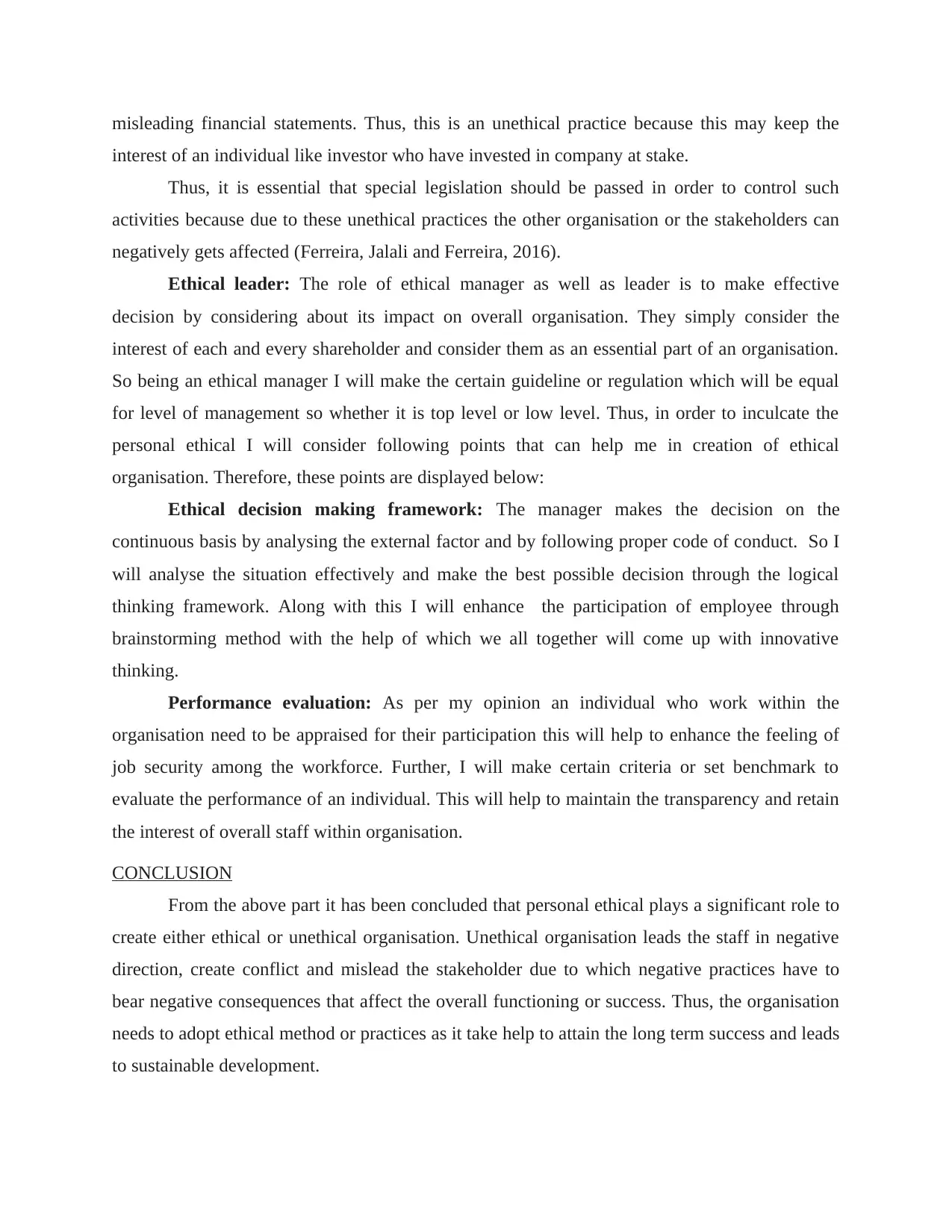
misleading financial statements. Thus, this is an unethical practice because this may keep the
interest of an individual like investor who have invested in company at stake.
Thus, it is essential that special legislation should be passed in order to control such
activities because due to these unethical practices the other organisation or the stakeholders can
negatively gets affected (Ferreira, Jalali and Ferreira, 2016).
Ethical leader: The role of ethical manager as well as leader is to make effective
decision by considering about its impact on overall organisation. They simply consider the
interest of each and every shareholder and consider them as an essential part of an organisation.
So being an ethical manager I will make the certain guideline or regulation which will be equal
for level of management so whether it is top level or low level. Thus, in order to inculcate the
personal ethical I will consider following points that can help me in creation of ethical
organisation. Therefore, these points are displayed below:
Ethical decision making framework: The manager makes the decision on the
continuous basis by analysing the external factor and by following proper code of conduct. So I
will analyse the situation effectively and make the best possible decision through the logical
thinking framework. Along with this I will enhance the participation of employee through
brainstorming method with the help of which we all together will come up with innovative
thinking.
Performance evaluation: As per my opinion an individual who work within the
organisation need to be appraised for their participation this will help to enhance the feeling of
job security among the workforce. Further, I will make certain criteria or set benchmark to
evaluate the performance of an individual. This will help to maintain the transparency and retain
the interest of overall staff within organisation.
CONCLUSION
From the above part it has been concluded that personal ethical plays a significant role to
create either ethical or unethical organisation. Unethical organisation leads the staff in negative
direction, create conflict and mislead the stakeholder due to which negative practices have to
bear negative consequences that affect the overall functioning or success. Thus, the organisation
needs to adopt ethical method or practices as it take help to attain the long term success and leads
to sustainable development.
interest of an individual like investor who have invested in company at stake.
Thus, it is essential that special legislation should be passed in order to control such
activities because due to these unethical practices the other organisation or the stakeholders can
negatively gets affected (Ferreira, Jalali and Ferreira, 2016).
Ethical leader: The role of ethical manager as well as leader is to make effective
decision by considering about its impact on overall organisation. They simply consider the
interest of each and every shareholder and consider them as an essential part of an organisation.
So being an ethical manager I will make the certain guideline or regulation which will be equal
for level of management so whether it is top level or low level. Thus, in order to inculcate the
personal ethical I will consider following points that can help me in creation of ethical
organisation. Therefore, these points are displayed below:
Ethical decision making framework: The manager makes the decision on the
continuous basis by analysing the external factor and by following proper code of conduct. So I
will analyse the situation effectively and make the best possible decision through the logical
thinking framework. Along with this I will enhance the participation of employee through
brainstorming method with the help of which we all together will come up with innovative
thinking.
Performance evaluation: As per my opinion an individual who work within the
organisation need to be appraised for their participation this will help to enhance the feeling of
job security among the workforce. Further, I will make certain criteria or set benchmark to
evaluate the performance of an individual. This will help to maintain the transparency and retain
the interest of overall staff within organisation.
CONCLUSION
From the above part it has been concluded that personal ethical plays a significant role to
create either ethical or unethical organisation. Unethical organisation leads the staff in negative
direction, create conflict and mislead the stakeholder due to which negative practices have to
bear negative consequences that affect the overall functioning or success. Thus, the organisation
needs to adopt ethical method or practices as it take help to attain the long term success and leads
to sustainable development.
⊘ This is a preview!⊘
Do you want full access?
Subscribe today to unlock all pages.

Trusted by 1+ million students worldwide
1 out of 13
Related Documents
Your All-in-One AI-Powered Toolkit for Academic Success.
+13062052269
info@desklib.com
Available 24*7 on WhatsApp / Email
![[object Object]](/_next/static/media/star-bottom.7253800d.svg)
Unlock your academic potential
Copyright © 2020–2026 A2Z Services. All Rights Reserved. Developed and managed by ZUCOL.





